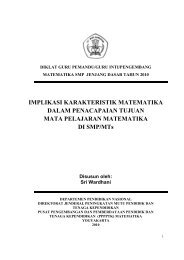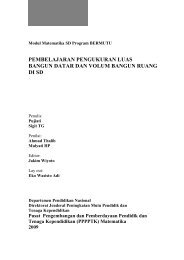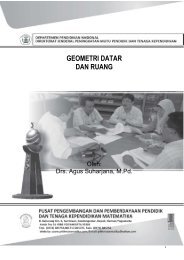25 Biggest Mistakes Teachers Make and How to Avoid Them
25 Biggest Mistakes Teachers Make and How to Avoid Them
25 Biggest Mistakes Teachers Make and How to Avoid Them
Create successful ePaper yourself
Turn your PDF publications into a flip-book with our unique Google optimized e-Paper software.
Mistake 14: Inappropriate Educational Strategies<br />
SCENARIO 14.12<br />
Competition Isn’t Always Good<br />
I hated being “bawled out” by teachers. I hated being forced <strong>to</strong> participate in competitive<br />
sports at school. I wasn’t good at this <strong>and</strong> found it humiliating.<br />
Students are often required<br />
<strong>to</strong> participate in competitive<br />
sports. Forced participation becomes<br />
a shame-based activity because students<br />
who are reluctant <strong>to</strong> participate<br />
are usually poor performers. They<br />
are uncomfortable about their ability<br />
<strong>to</strong> perform <strong>and</strong> about their teammates’<br />
reaction <strong>to</strong> their performance.<br />
Reluctant students are usually the<br />
last <strong>to</strong> be chosen <strong>to</strong> be on a team. This<br />
agonizing form of rejection has longlasting<br />
effects. It reinforces a child’s<br />
feeling of inadequacy.<br />
Although teachers cannot eliminate<br />
competition in sports at school,<br />
they can minimize its adverse effects<br />
113<br />
on students by recognizing their<br />
good qualities. Gardner (1993) proposes<br />
a theory of multiple intelligences<br />
that suggests that different<br />
students may be intelligent in dif ferent<br />
ways. Versatile teachers will<br />
showcase the poor performers’ talents<br />
in one of these areas. Beha v -<br />
iorists such as Skinner (1953) would<br />
argue that this student’s dislike of<br />
competitive sports may be attributed<br />
<strong>to</strong> classical or operant conditioning,<br />
where the student asso ciates<br />
the negative feelings of humiliation<br />
with the sport <strong>and</strong> sub sequently<br />
becomes conditioned <strong>to</strong> hate competitive<br />
sports.<br />
SCENARIO 14.13<br />
Keep Working, Rain, Shine, Sleet, or Divorce<br />
When I was in the third grade Mrs. L. was my teacher. I lived in Massachusetts <strong>and</strong> my<br />
parents were getting a divorce so I was quite upset most of the time. Mrs. L. would<br />
always make me read when I had been or was crying. I could never underst<strong>and</strong> why<br />
but now I do. I believe that she was trying <strong>to</strong> deter my thoughts <strong>to</strong> something else, but<br />
at the time I hated her for it <strong>and</strong> will never forget it.<br />
This is an inappropriate strategy<br />
<strong>to</strong> expect some form of academic<br />
performance when children are<br />
visibly upset. This strategy may set<br />
children up for conduct problems or<br />
other inappropriate behavior. The children<br />
may either refuse <strong>to</strong> participate<br />
or, as in this case, be so anguished that<br />
they are scarred for life. This student<br />
was traumatized by this event, as evidenced<br />
by the strong emotional <strong>to</strong>ne<br />
of the sentence, “I hated her <strong>and</strong> I’ll<br />
never forget it,” <strong>and</strong> underlining the<br />
sentence for emphasis. If children are





